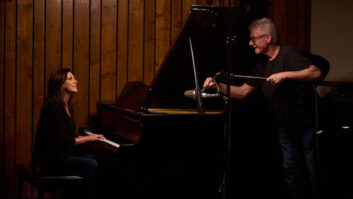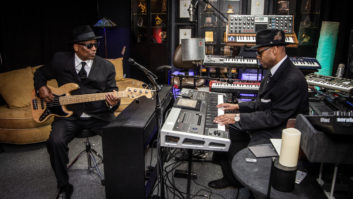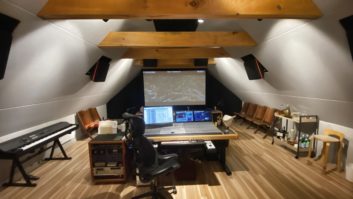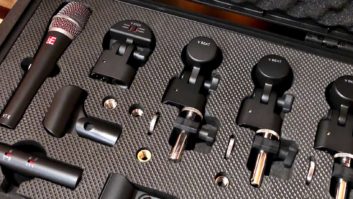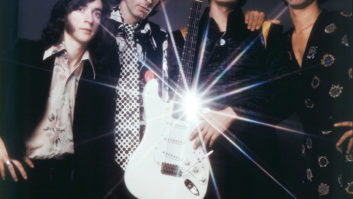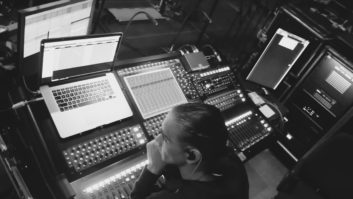Liam Finn is part of an incredibly musical family that includes his father, Neil Finn (of Crowded House, Split Enz), and uncle Tim Finn (also of Split Enz and an accomplished solo artist). Liam just completed his sophomore album, FOMO—or Fear of Missing Out.

The atmosphere of the new album was created in part by Liam exiling himself to a remote beach in New Zealand, where he escaped following three years of incessant touring the world. He spent the next six months writing the album there before moving the project to his father’s state-of-theart Roundhead Studios in Auckland, where it was recorded and completed.
Pro Sound News spoke to Liam about why it is important to keep things fresh while maintaining a great work ethic in the studio.
On Writing and Preparing:
I spent about six months writing the album, living out at the beach, basically. I retreated from everything I have been doing the previous three years, including touring. I went to a place called Piha in northern New Zealand; it is somewhere that I went very often when I was a kid and is the kind the place I think about when I can’t sleep at night. I always wanted to live there, and knew I needed to write a new record, so I moved there. It was a beautiful place to work, but quite a shock to the system since I’ve been so used to being stimulated with people, shows, traveling and all that. That was one thing that sparked the atmosphere that was created on some of the early songs I wrote. I found that it was really hard to write. Ironically, the songs that made it on the record I hadn’t even realized I’d written, and the ones that I was trying to write were not coming.
On Sophomore Pressure:
There was definitely a lot of selfimposed pressure. It wasn’t like a follow-up to my first solo record, but rather more like a statement. I also put so much energy in building up a following internationally. If you are a New Zealand-based musician, you’ve got to keep at it and not go home. You’ve got to follow up and follow up. I was also worried that going home might have been a mistake and that I might have lost some momentum. That pressure made it hard and meant that I didn’t find it easy to write the songs at all. But somewhere in between those really hard moments, things came out, almost without my being aware of it.
On Recording at Dad ’s:
The studio is very easy for me to use since it is located in Auckland and that’s where I was living. It’s an amazing studio, with beautiful gear and microphones. But at the same time, it has a very homely feel and I feel comfortable there. It is an old ballroom hall located on the top floor of a building, and Dad made sure they really kept the original feel of the environment. I still had to pay for it, but I think that kind of pressure is quite good, knowing that you have a certain amount of time in which you need to get it done. If you hit a wall, you can’t sit there feeling sorry for yourself. You’ve got to forge on.
On Instruments and Gear:
For this record, I was more in control of the instrument side of it than anything else. Burke [Reid], my producer, was manning the desk. My staple guitar is a ’67 Tele; you can make so many different sounds from that, and that’s what I’ve been playing on stage for the last few years. I use a JMI amplifier, a 15-watt amp that sounds kind of like an AC 30. It delivers a nice, warm Neil Young kind of growl. We used a lot of pedals for effects on the record, rather than using rack effects. One of those effects was an old, electro-harmonix Memory Man. Burke and I wanted to use this amazing studio with all this great gear, but make our recordings sound as dirty, crusty and wild as possible.
On Being a One-Man Show:
I ended up playing everything on this record except for a bass track and some drum loops. We were lucky enough to have Glenn Kotche [Wilco] play while he was in town. We tracked everything without keeping to any kind of strict methodology. It was all about getting as many interesting and spontaneous takes as possible. If I were in the mood for drumming, I’d put drums down. The most important part, though, was adding the vocal part early on, because then I knew where I needed to color it in later. So, in a way, it was like a painting. We just kept adding to it.
Burke keeps an eye on things and notes when the inspired moments happen. The liberating thing for me was to be working with a producer and in Pro Tools, because I could go as wild as I wanted to and play off the cuff if I felt like it. Burke kept track of where the good bits were and helped piece it all together. It was conducive to keeping things inspired and interesting.
On Work Ethics:
Watching how hard my dad works in the studio and the long hours he puts in has had a huge influence on me. He is so driven and has so much energy for it. This is, in part, why I haven’t been able to slack off, because I kick myself and say, “You’ve got to work harder than this and go to at least 2 or 3 a.m.” The work ethic is a big part of it, and also, Dad is a perfectionist. Not to get it perfect, but to get it exactly as you hear it in your head. Even if things are just a wild, one-take jam, it still has to be the right one. You still need to agonize over every aspect to get your point across.
Jeff Touzeau is a regular contributor to Pro Sound News and author of The Green Musician’s Guide: Sound Ideas for a Sound Planet.

